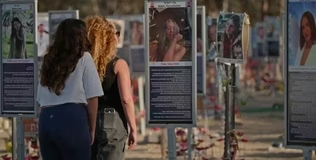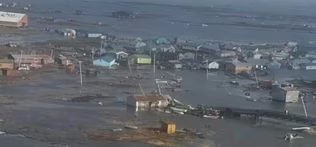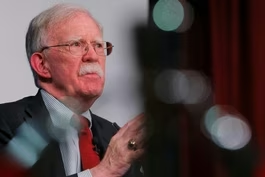
Abortion bans fueling rise in domestic violence, experts say
Clip: 10/16/2025 | 8m 54sVideo has Closed Captions
Abortion restrictions may be fueling a rise in domestic violence, experts warn
On average, a woman’s risk of being killed in the U.S. increases by 20% when pregnant or after giving birth. Pregnant and postpartum women are more likely to be killed than to die from childbirth-related issues. Many killings are the result of domestic violence. Special correspondent Sarah Varney reports from Louisiana, where experts say abortion restrictions are putting women further at risk.
Problems playing video? | Closed Captioning Feedback
Problems playing video? | Closed Captioning Feedback
Major corporate funding for the PBS News Hour is provided by BDO, BNSF, Consumer Cellular, American Cruise Lines, and Raymond James. Funding for the PBS NewsHour Weekend is provided by...

Abortion bans fueling rise in domestic violence, experts say
Clip: 10/16/2025 | 8m 54sVideo has Closed Captions
On average, a woman’s risk of being killed in the U.S. increases by 20% when pregnant or after giving birth. Pregnant and postpartum women are more likely to be killed than to die from childbirth-related issues. Many killings are the result of domestic violence. Special correspondent Sarah Varney reports from Louisiana, where experts say abortion restrictions are putting women further at risk.
Problems playing video? | Closed Captioning Feedback
How to Watch PBS News Hour
PBS News Hour is available to stream on pbs.org and the free PBS App, available on iPhone, Apple TV, Android TV, Android smartphones, Amazon Fire TV, Amazon Fire Tablet, Roku, Samsung Smart TV, and Vizio.
Providing Support for PBS.org
Learn Moreabout PBS online sponsorshipAMNA NAWAZ: A woman's risk of being killed in the United States increases by 20 percent on average when pregnant or after giving birth.
For those under 25, that risk more than doubles.
In fact, pregnant and postpartum women are more likely to be killed than die from childbirth-related issues like severe bleeding, infection and high blood pressure.
Special correspondent Sarah Varney reports, many of these killings are the result of domestic violence.
She traveled to Louisiana, where experts say state abortion restrictions are putting women further at risk.
SHONA CHAVIS, Mother: I often say I experienced domestic violence from within my mother's womb.
SARAH VARNEY: Shona Chavis grew up in rural Louisiana with a father that brutalized her mother even when she was pregnant.
The couple's second daughter died during childbirth because of that abuse, less than a year before Shona was born.
SHONA CHAVIS: I remember, even as a little child, I might have been 2, 3 years old, my dad calling us into the room to sit down and watch him beat my mom.
SARAH VARNEY: Years later, Shona saw some of those same patterns in her own husband as he began controlling and abusing her.
Once she had children, it became even harder to leave.
SHONA CHAVIS: I need to leave because I need to make sure that my kids are safe.
But if I leave, are we going to be safe?
Because you're also thinking about if you leave and you go to court and he gets custody.
Because, in your mind, you're already not thinking clear.
You're believing that you're dumb, you're crazy, you're stupid, because he's told you all of this, and your brain is not really working properly because of all the licks to your head.
Then I'm not going to have my kids and I can't protect them.
SARAH VARNEY: Shona's story is all too common across the country, says Mariah Wineski.
MARIAH WINESKI, Louisiana Coalition Against Domestic Violence: A lot of legislators don't have a solid understanding of the impact of domestic violence.
SARAH VARNEY: Wineski runs the Louisiana Coalition Against Domestic Violence.
She says, when a victim is pregnant or gives birth, their abuser becomes more controlling.
MARIAH WINESKI: What has happened now is it has escalated over time due to a perceived loss of control over this woman, over their relationship, combined with an increase in barriers that the victim is facing.
She can no longer simply walk away, and unfortunately women are dying as a result.
SARAH VARNEY: In the U.S., homicide is the leading cause of death for pregnant and postpartum women.
Nearly half of those killings involved domestic violence.
In states with abortion restrictions, that homicide rate is 75 percent higher.
MARIAH WINESKI: Any time that you're increasing barriers, taking options away, you are reducing her chances at getting safe.
SARAH VARNEY: A study released earlier this year found in states that implemented near-total abortion ban since 2022, domestic violence increased up to 10 percent.
And in those states, experts told us even the work-arounds are difficult.
Women who are closely watched by their abusers can't safely get abortion pills at home or travel to another state.
LIZ TOBIN-TYLER, Brown University: When women don't have access to abortion, they're much more likely to experience domestic violence.
SARAH VARNEY: Liz Tobin-Tyler teaches public health law at Brown University.
She believes today's restrictions are sending a larger message.
LIZ TOBIN-TYLER: That really signals to abusive partners that they also can control their partner's decision-making around reproduction and around bodily autonomy.
So I think the sort of state control actually empowers abusive partners in a way to see themselves as even in more control of their partner.
CORINNE LEPAGE, Massachusetts Resident: I couldn't have a child.
I was about to be 21, had no idea what I was doing with myself, with my life.
And I wasn't ready for that.
SARAH VARNEY: Sixteen years ago, Corinne LePage was pregnant and stuck in an abusive relationship.
Her boyfriend had secretly switched out her birth control pills for mints to get her pregnant.
Because she lived in Massachusetts, Corinne was able to get an abortion.
CORINNE LEPAGE: I can't imagine being in that situation and not making the choice I made or not having the ability to make the choice that I made, because I don't know where I would be now if I still had this attachment to this person who progressively has gotten more violent as time has gone on.
SARAH VARNEY: Years later, caught in another abusive relationship, Corinne became pregnant again.
But that pregnancy ended in a miscarriage that she says was caused by the abuse.
CORINNE LEPAGE: He never wore protection.
That wasn't a thing that was like allowed.
So what I would do is, I'd sneak plan B. I had to do what I had to do.
JASMINE HULL, Mother: I first met my kid's father when I was 16.
We were friends for a minute, and then we actually decided to be in a relationship.
SARAH VARNEY: At what point does this turn into something that's physical, where there's physical abuse?
JASMINE HULL: When my son was about 6 months.
SARAH VARNEY: Jasmine Hull, who lives in Northern Louisiana with her three children, left St.
Louis to get away from her abusive partner.
Looking back at it now, how do you make sense of why being pregnant was a trigger for him?
JASMINE HULL: I really don't think that being pregnant was the trigger.
I think that being pregnant was the trap.
SARAH VARNEY: Domestic violence experts say abusers frequently control their partner's sexual and reproductive health through manipulation, threats and abuse, what's called reproductive coercion.
MARIAH WINESKI: We often see that abusers will purposely impregnate or purposely sabotage birth control methods, for example, or might sexually assault their victim when they know that it will result or is more likely to result in a pregnancy.
SARAH VARNEY: Anti-abortion activists argue that's why abortion bans are needed.
They point to cases of men tricking women into taking abortion pills.
In a statement to the "News Hour," Marjorie Dannenfelser, president of the anti-abortion advocacy group, SBA Pro-Life America, told us: "Domestic violence is wrong and that's something we should all be able to agree on.
But abortion advocates don't want to acknowledge the epidemic of intimate violence 50-plus years of abortion on demand has unleashed on women and girls, let alone unborn children."
LIZ TOBIN-TYLER: It's not that can't happen or doesn't happen.
SARAH VARNEY: Tobin-Tyler says abusers are more likely to prevent an intimate partner from receiving health care.
LIZ TOBIN-TYLER: The bigger point is that any kind of control or any kind of coercion about what access a woman has to what she desires in terms of reproductive health care is indicative of an abusive relationship.
ANTHONY HINGLE, Beyond Harm: And a lot of times they say, oh, she disrespected me.
How did she disrespect you?
And what it is, is, you were hurt.
You were hurt by something and you felt like you lacked control.
SARAH VARNEY: At Beyond Harm, a domestic violence intervention organization in New Orleans, Anthony Hingle works with abusers to help stop cycles of violence.
ANTHONY HINGLE: We get the guys to write on the front of the mask what they want the world to see.
SARAH VARNEY: He says men in the program are reluctant to admit they abused a woman when she was pregnant or with a newborn at home.
ANTHONY HINGLE: The lack of control, I definitely think is that spark.
We're going to have this new breathing human being.
This is going to bring more uncertainty into my life.
This is going to bring more responsibility, more chaos.
SARAH VARNEY: Hingle says abortion bans heighten those dangerous dynamics.
ANTHONY HINGLE: I think it's a lot of pressure from the guy.
You have to go get this abortion.
You have to get this done.
I can't.
Now he's upset.
Now he's angry.
And even though this is out of her control, he's taking it like it's her fault.
SARAH VARNEY: Today, Corinne LePage is a student at Brown University on her way to a degree in environmental science.
Despite the pain of her experiences, Corinne says she's lucky because she could get help.
CORINNE LEPAGE: When you experience domestic violence, I think that you already have so much taken away from you.
And then you try to access this care and then you're also hitting roadblocks.
There should be no one making laws about other people's bodies.
SARAH VARNEY: Survivors like Shona Chavis say victims need to be given support and the freedom to choose their future if they're ever going to escape.
SHONA CHAVIS: They have to have that support.
They have to have those buffers.
They have to have the people around them to be able to help them, because that can make the difference in them staying or leaving or living or dying.
SARAH VARNEY: For "PBS News Hour," I'm Sarah Varney in Louisiana.
How Israelis are working to process the trauma of Oct. 7
Video has Closed Captions
Clip: 10/16/2025 | 8m | How Israelis are working to process the collective trauma of the Oct. 7 attacks (8m)
Rescue crews airlift hundreds out of rural Alaskan villages
Video has Closed Captions
Clip: 10/16/2025 | 7m 3s | Rescue crews airlift hundreds out of rural Alaskan villages after powerful storm (7m 3s)
Trump adviser turned critic John Bolton indicted
Video has Closed Captions
Clip: 10/16/2025 | 5m 41s | Trump adviser turned critic John Bolton indicted over handling of classified documents (5m 41s)
Trump weighs Venezuela land strikes following boat attacks
Video has Closed Captions
Clip: 10/16/2025 | 10m 20s | Trump weighs land strikes in Venezuela following attacks on suspected drug boats (10m 20s)
Young Republicans' hateful group chat sparks condemnation
Video has Closed Captions
Clip: 10/16/2025 | 5m 26s | Young Republicans' hateful group chat sparks bipartisan condemnation (5m 26s)
Providing Support for PBS.org
Learn Moreabout PBS online sponsorship
- News and Public Affairs

FRONTLINE is investigative journalism that questions, explains and changes our world.

- News and Public Affairs

Amanpour and Company features conversations with leaders and decision makers.












Support for PBS provided by:
Major corporate funding for the PBS News Hour is provided by BDO, BNSF, Consumer Cellular, American Cruise Lines, and Raymond James. Funding for the PBS NewsHour Weekend is provided by...




